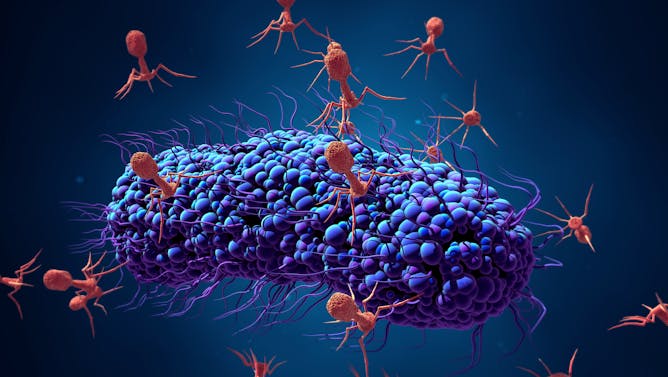|
|
|
Editor's note
|
|
Antibiotic resistance is one of the biggest issues of the 21st century. It threatens everything from global health to food security, making easily treatable infections like gonorrhoea and salmonellosis impossible to cure. The good news is that there might be a secret antidote. Not only is it one of the world’s most abundant organisms, it is about the last place you might have thought to look for a cure to a disease.
Bacteriophages are a type of virus. They’re also very efficient killers of bacteria, and can also be engineered to be more effective at fighting different strains. They’re able to inject their DNA into a bacterial cell and destroy it, preventing it from multiplying further. Although phage therapy was discovered in the 1930s, the cure fell by the wayside after the Second World War, when antibiotics become commonplace in the West. The
treatment was widely used in the Soviet Union, however – and is still commonly used against bacterial infections in Georgia and Russia.
We also learned today that the UK government’s plan to fight the obesity crisis might not be as simple as encouraging children to walk to school. A recent study by academics at the University of Liverpool found that children living in deprived areas were both most likely to walk to school, and more likely to be overweight. While there are numerous explanations for these findings, combating childhood obesity essentially comes down to tackling
inequality in deprived communities.
Is this thing on? Amazon’s popular voice assistant Alexa has suffered widely publicised privacy issues related to the way it records users talking, but worse could be yet to come. As the company partners with more organisations such as the police and NHS, the risks of sensitive data being gathered and shared increase, argues one researcher. The case for avoiding bringing Alexa into your home could be growing.
|
Heather Kroeker
Assistant Section Editor
|

|
|
Top stories
|

Bacteriophages infecting a bacterial cell.
Design_Cells/ Shutterstock
Manal Mohammed, University of Westminster; Andrew Millard, University of Leicester
Bacteriophages are viruses that infect bacteria. But could they be key in solving the antibiotic resistance epidemic?
|

NadyaEugene/Shutterstock
Rob Noonan, University of Liverpool
Poor neighbourhoods are driving health inequalities in children.
|

HeikoAL/Pixabay
Garfield Benjamin, Solent University
Hey Alexa, who are you sharing my data with?
|
Politics + Society
|
-
Graham Hill, University of Leeds
The fear of 'racial tension' has been at the heart of many botched police inquiries into child sexual abuse.
-
Kaweh Kerami, SOAS, University of London
Why Afghanistan is still waiting to hear who its next president will be – nearly four months after the election.
-
David Rowe, Western Sydney University
From Peter O'Connor waving the Irish flag in 1906 to rainbow colours at Sochi, athletes have always used the Olympics to share their politics.
-
Matthew Powell, University of Portsmouth
Buying the biggest and best technology is always going to be high risk and expensive.
|
|
Environment + Energy
|
-
Ella Adlen, University of Oxford; Cameron Hepburn, University of Oxford
CO₂ will need to be removed from the atmosphere to avoid catastrophic heating. Can the process be incentivised?
|
|
Arts + Culture
|
-
Mary Williams, University of Portsmouth
It's a bold move, but publishers are increasingly desperate to attract digital readers to offset the fall in print sales.
|
|
Health + Medicine
|
-
Deborah Bateson, University of Sydney; Kathleen McNamee, Monash University
The pill doesn't actually work 100% of the time. If you take the pill or are thinking about it here's how to use it for maximum effectiveness.
|
|
| |
Featured events
|

|
Aston Triangle, Birmingham, Birmingham, B4 7ET, United Kingdom of Great Britain and Northern Ireland — Aston University
|

|
Bowland Auditorium, Berrick Saul Building, Campus West, York, York, YO10 5DD, United Kingdom of Great Britain and Northern Ireland — University of York
|

|
Bowland Auditorium, Berrick Saul Building, Campus West, York, York, YO10 5DD, United Kingdom of Great Britain and Northern Ireland — University of York
|

|
School of the Arts, 19-23 Abercromby Square, Liverpool, L69 7ZG, United Kingdom of Great Britain and Northern Ireland — University of Liverpool
|
|
|
|
| |
| |
| |
| |
| |
|
|
|
|
|
|
|